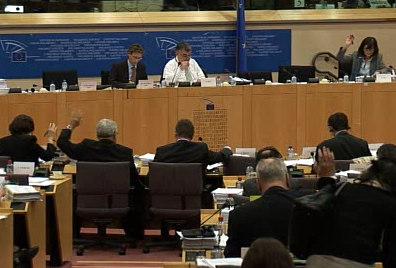Paris, April 12th, 2011 – The Industry Committee of the European Parliament has adopted amendments to the EU Spectrum Policy Programme allowing for a free use of airwaves for citizens, which will lead to the development of the next generations of free wireless Internet communications (“next generation WiFi”). This vote is encouraging and must be confirmed in plenary, despite the pressure that broadcasters and telecoms industries will inevitably put on the European Parliament to keep airwaves under control.
 Today, the EU Parliament committee on Industry, Transport and Research (ITRE) adopted constructive amendements to the spectrum policy programme put forward by the Commission. The ITRE committee adopted amendments encouraging unlicensed uses of spectrum, and in particular of so-called “white spaces” (bands of frequencies located between frequencies allocated to industries and left unused)1See in particular compromise amendment 6: Member States shall foster, in cooperation with the Commission, the collective use of spectrum as well as shared and unlicensed use of spectrum, and foster current and new technologies such as geolocation database and cognitive radio to develop for example in white spaces after proper impact assessment is made.
Today, the EU Parliament committee on Industry, Transport and Research (ITRE) adopted constructive amendements to the spectrum policy programme put forward by the Commission. The ITRE committee adopted amendments encouraging unlicensed uses of spectrum, and in particular of so-called “white spaces” (bands of frequencies located between frequencies allocated to industries and left unused)1See in particular compromise amendment 6: Member States shall foster, in cooperation with the Commission, the collective use of spectrum as well as shared and unlicensed use of spectrum, and foster current and new technologies such as geolocation database and cognitive radio to develop for example in white spaces after proper impact assessment is made.
See also amendments 44 and 121:
http://www.laquadrature.net/wiki/Spectrum_Policy_Programme_Amendments#Amendment_44_.2B.2B
http://www.laquadrature.net/wiki/Spectrum_Policy_Programme_Amendments#Amendment_121_.2B
. Other amendments open the door to the use of mesh networks2https://secure.wikimedia.org/wikipedia/en/wiki/Mesh_networking and femtocells3https://secure.wikimedia.org/wikipedia/en/wiki/Femtocell.4See amendments 75, 256, 357:
http://www.laquadrature.net/wiki/Spectrum_Policy_Programme_Amendments#Amendment_75_.2B.2B
http://www.laquadrature.net/wiki/Spectrum_Policy_Programme_Amendments#Amendment_256_.2B.2B
http://www.laquadrature.net/wiki/Spectrum_Policy_Programme_Amendments#Amendment_357_.2B.2B Such a vote will allow everyone, be they citizens or businesses, to experiment new types of networks and technologies. Meanwhile, some bad amendments originating from broadcasters or telecoms industry aimed at locking down their control over the airwaves were partly undermined by the committee’s vote.
Such an open approach paves the way for the next generation of wireless Internet networks, similarly to what happened with the growth of WiFi networks at the end of the 90’s. By allowing for the development of unlicensed uses of airwaves, spectrum can become a commons once again, enabling for instance local authorities to autonomously connect remote or rural areas to high-speed wireless Internet, thus bridging the “digital divide” without waiting for telecom operators to invest in these markets.
“Citizens should be thankful to the Members of the ITRE committee for their encouraging vote in favor of free and open wireless communications. This vote must now be confirmed by the rest of the Parliament, in plenary. We can be sure that the telecoms and broadcasting industries will lobby hard in order to remain in control of airwaves. For the sake of innovation and freedom of communication, it is crucial that wireless Internet becomes more open, and that the Commission actually and promptly follows the opinion of the Parliament towards an inclusive spectrum policy,” concludes Jérémie Zimmermann, co-founder and spokesperson of citizen organization La Quadrature du Net.
References

